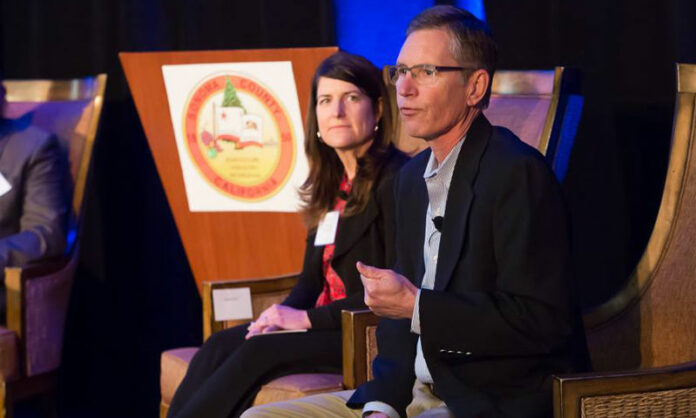
Recovery activity will boost local jobs, housing
The state of Sonoma County’s economy has been deemed to be steady and even “soaring” despite the recent historic wildfire destruction and wild swings in 2017 from the wettest winter on record to the hottest harvest season.
That assessment was delivered by UCLA economist Dr. Jerry Nickelsburg to a capacity crowd last week at the county’s annual State of the County breakfast. He based his long-range projections on continued record-low unemployment, more job creation, rising property values, an attractive tourism industry and the recently demonstrated community spirit that is responding to the wildfire recovery and rebuilding efforts.
Sonoma County’s economy will benefit from the wildfire recovery as thousands of destroyed homes are rebuilt and millions of private insurance and federal disaster relief dollars flow into the county, Nickelsburg said.
Finding enough construction workers and building materials will be a challenge, the economist said, along with whether the current wildfire recovery efforts can be transformed into longer range recovery and economic development programs.
James Gore, new chair of the county Board of Supervisors stressed the need for the county’s business, civic and government leaders to plan and push beyond merely replacing what existed before the wildfires. “We are all we’ve got, but we’ve got to own our future and not let it own us,” he said.
Prior to the Oct. 8 wildfires, the county’s economy was outpacing both the California and national economy, Nickelsburg said, although it was showing signs of beginning to slow down.
“Basically, your economy was hitting its capacity,” with no idle labor and a challenging housing market, Nicklesburg said. The new adult cannabis market will spur new growth along with the wildfire recovery activity, he also said.
The regional economy should expand by 2.8 percent during 2018 and looks “very bright.” He said the county does not have a housing “bubble” as he blamed record-high housing costs on a severe housing shortage, now made worse by the wildfire that destroyed over 5,000 homes.
The recent Republican tax cuts were called a “sugar high” by the UCLA economist who criticized the action as “borrowing from our future” for a brief, one-time jolt of cash.
Other presenters at the breakfast confab included Beth Brown of Community Foundation of Sonoma County; Reno Franklin of the Kashia Band of Pomo Indians; Brett Martinez of Redwood Credit union and North Bay Fire Relief Fund; and Ana Lugo of the North Bay Organizing Project and the Undocufund.
The theme of all the speakers was about “building hope and resiliency.” Speakers urged the audience of county leaders to continue efforts of “collective responsibility” and new partnerships.
The 2018 Economic Forecast session followed a different format from past years beginning with a rousing live musical offering from the Black Sheep Brass Band, recent recipients of a county arts grant.
The keynote speakers and panel discussions were followed by break-out sessions focused on housing, workforce and education, economic recovery and collective impact. The event was coordinated by the county’s Economic Development Board.







